
Luke Skywalker is a fictional character and the protagonist of the original film trilogy of the Star Wars franchise created by George Lucas. Portrayed by Mark Hamill, Luke first appeared in Star Wars (1977), and he returned in The Empire Strikes Back (1980) and Return of the Jedi (1983). Over three decades later, Hamill returned as Luke in the Star Wars sequel trilogy, cameoing in The Force Awakens (2015) before playing a major role in The Last Jedi (2017) and The Rise of Skywalker (2019). He later played a digitally de-aged version of the character in the Disney+ series The Mandalorian, appearing in the second-season finale, which premiered in 2020, and The Book of Boba Fett, in the sixth episode, released in 2022.

Ronald William Howard is an American director, producer, screenwriter, and actor. He first came to prominence as a child actor, guest-starring in several television series, including an episode of The Twilight Zone. He gained national attention for playing young Opie Taylor, the son of Sheriff Andy Taylor in the sitcom The Andy Griffith Show from 1960 through 1968. During this time, he also appeared in the musical film The Music Man (1962), a critical and commercial success. He was credited as Ronny Howard in his film and television appearances from 1959 to 1973. Howard was cast in one of the lead roles in the coming-of-age film American Graffiti (1973), and became a household name for playing Richie Cunningham in the sitcom Happy Days, a role he would play from 1974 to 1980.
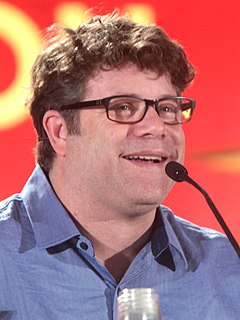
Sean Patrick Astin is an American actor. His acting roles include Samwise Gamgee in The Lord of the Rings trilogy (2001–2003), Mikey Walsh in The Goonies (1985), Daniel Ruettiger in Rudy (1993), Doug Whitmore in 50 First Dates (2004), Bill in Click (2006), Lynn McGill in the fifth season of 24 (2006), Oso in Special Agent Oso (2009–2012), Raphael in Teenage Mutant Ninja Turtles (2012–2017), Bob Newby in the second and third seasons of Netflix's Stranger Things, and Ed in No Good Nick (2019).
The Deptford Trilogy is a series of inter-related novels by Canadian novelist Robertson Davies.

The Parable of the Prodigal Son is one of the parables of Jesus Christ in the Bible, appearing in Luke 15:11–32. Jesus shares the parable with his disciples, the Pharisees and others.
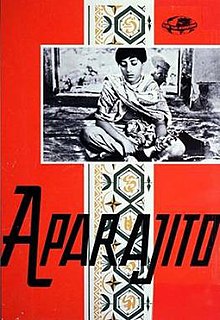
Aparajito is a 1956 Indian Bengali-language drama film written and directed by Satyajit Ray (1921–1992), and is the second part of The Apu Trilogy. It is adapted from the first half of Bibhutibhushan Bannerjee's novel Aparajito. It starts off where the previous film Pather Panchali (1955) ended, with Apu's family moving to Varanasi, and chronicles Apu's life from childhood to adolescence in college.
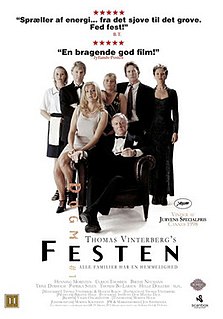
Festen is a 1998 Danish dark comedy-drama film directed by Thomas Vinterberg and produced by Nimbus Film.

Through a Glass Darkly is a 1961 Swedish drama film written and directed by Ingmar Bergman, and starring Harriet Andersson, Gunnar Björnstrand, Max von Sydow and Lars Passgård. The film tells the story of a schizophrenic young woman (Andersson) vacationing on a remote island with her husband, novelist father (Björnstrand), and frustrated younger brother (Passgård).

Arabian Nights is a 1974 Italian film directed by Pier Paolo Pasolini. Its original Italian title is Il fiore delle mille e una notte, which means The Flower of the One Thousand and One Nights.

Winter Light is a 1963 Swedish drama film written and directed by Ingmar Bergman and starring his regulars, Gunnar Björnstrand, Ingrid Thulin and Max von Sydow. It follows Tomas Ericsson (Björnstrand), pastor of a small rural Swedish church, as he deals with an existential crisis and his Christianity.
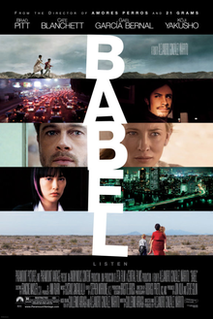
Babel is a 2006 psychological drama film directed by Alejandro González Iñárritu and written by Guillermo Arriaga. The multi-narrative drama completes Arriaga's and Iñárritu's Death Trilogy, following Amores perros and 21 Grams. It is an international co-production among companies based in the United States, Mexico and France. The film features an ensemble cast and use of hyperlink cinema, which portrays interwoven stories taking place in Morocco, Japan, Mexico, and the United States.

And Life Goes On is a 1992 Iranian film directed by Abbas Kiarostami. It was screened in the Un Certain Regard section at the 1992 Cannes Film Festival. It is considered the second film in Kiarostami's Koker trilogy.

Jason R. Reitman is a Canadian-American actor and filmmaker, best known for directing the films Thank You for Smoking (2005), Juno (2007), Up in the Air (2009), Young Adult (2011), and Ghostbusters: Afterlife (2021). He has received one Grammy Award, one Golden Globe, and four Academy Award nominations, two of which are for Best Director. Reitman is a dual citizen of Canada and the United States. He is the son of director Ivan Reitman, and known for frequently collaborating with screenwriter Diablo Cody.

Luke 15 is the fifteenth chapter of the Gospel of Luke in the New Testament of the Christian Bible. The book containing this chapter is anonymous, but early Christian tradition uniformly affirmed that Luke the Evangelist composed this Gospel as well as the Acts of the Apostles. This chapter records three parables of Jesus Christ: the lost sheep, the lost coin and the lost or 'prodigal' son, a trilogy about redemption that Jesus tells after the Pharisees and religious leaders accuse him of welcoming and eating with "sinners".

Prince Hamlet is the title role and protagonist of William Shakespeare's tragedy Hamlet (1599–1601). He is the Prince of Denmark, nephew to the usurping Claudius, and son of King Hamlet, the previous King of Denmark. At the beginning of the play, he struggles with whether, and how, to avenge the murder of his father, and struggles with his own sanity along the way. By the end of the tragedy, Hamlet has caused the deaths of Polonius, Laertes, Claudius, and Rosencrantz and Guildenstern, two acquaintances of his from childhood. He is also indirectly involved in the deaths of his love Ophelia (drowning) and of his mother Gertrude.

Margot at the Wedding is a 2007 American comedy-drama film written and directed by Noah Baumbach. It stars Nicole Kidman, Jennifer Jason Leigh, Jack Black, John Turturro, Ciarán Hinds and Halley Feiffer. The film is about the familial storm that arises when Margot, a writer, comes to visit her sister Pauline on the eve of her wedding.

Ashes of Paradise is a 1997 Argentine crime drama film directed by Marcelo Piñeyro. It tells in flashbacks how the untroubled private happiness of a family – a judge and his three grown-up sons – crumbles between loyalty and betrayal, blind trust and suspicions.
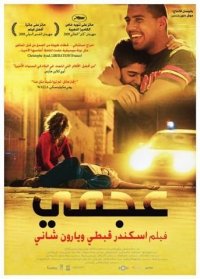
Ajami is a 2009 Israeli Arab drama film. Its plot is set in the Ajami neighborhood of Jaffa, Tel Aviv, Israel.

In a Better World is a 2010 Danish drama thriller film written by Anders Thomas Jensen and directed by Susanne Bier. The film stars Mikael Persbrandt, Trine Dyrholm, and Ulrich Thomsen in a story which takes place in small-town Denmark and a refugee camp in Africa.
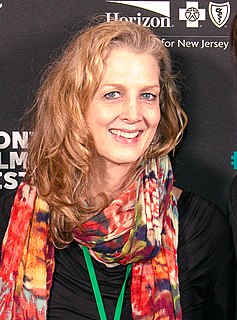
Kimberly Reed is an American film director and producer who is best known for her documentaries Prodigal Sons and Dark Money which premiered at the 2018 Sundance Film Festival. In 2007, Filmmaker magazine named her one of the "25 New Faces of Independent Film."



















